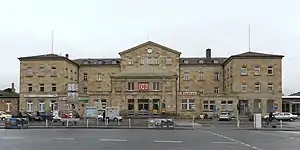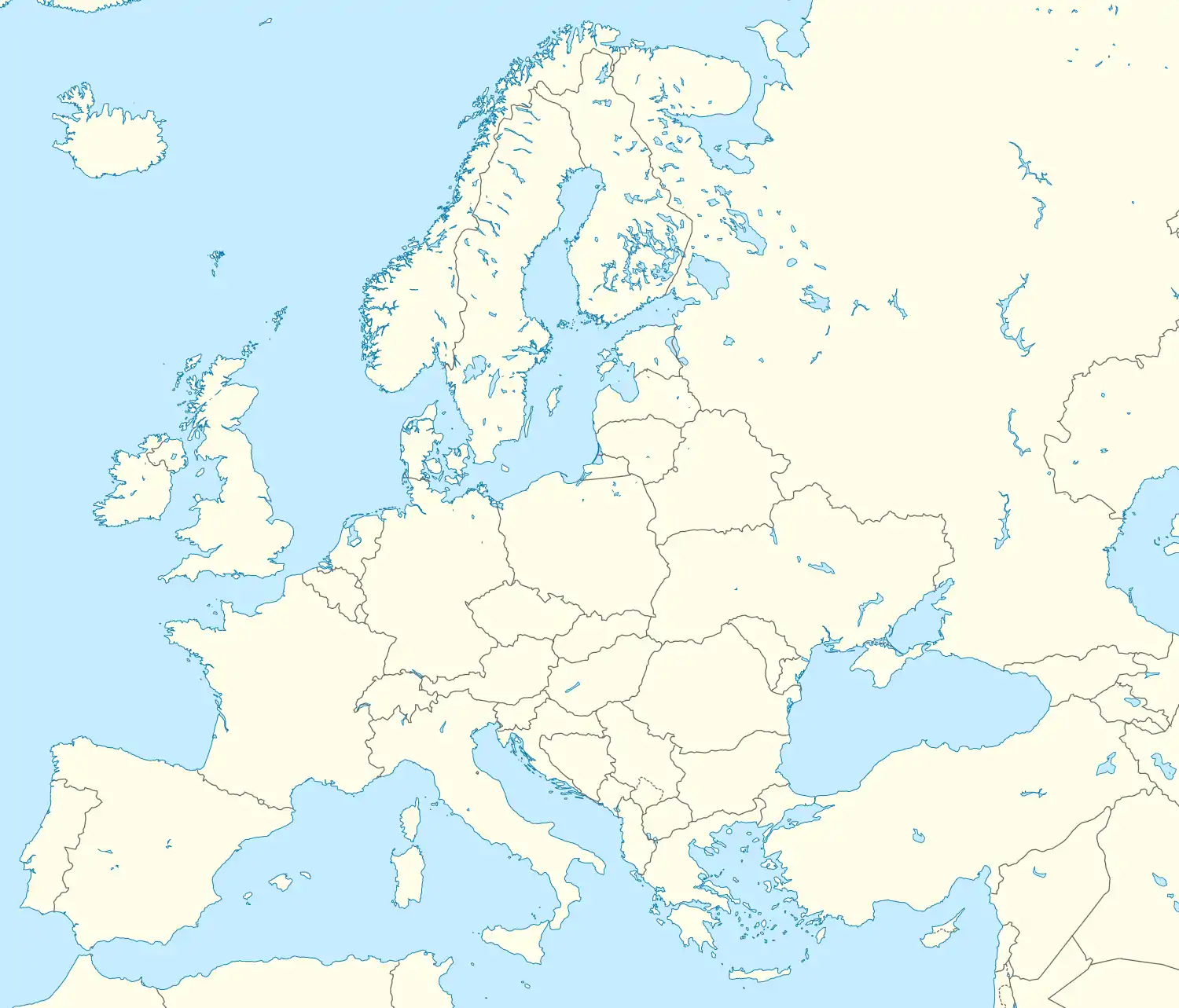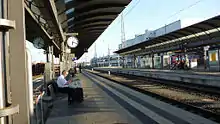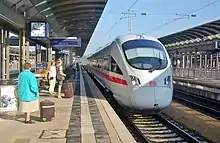Bamberg station
Bamberg station is the only passenger station of the city of Bamberg in Upper Franconia in the German state of Bavaria. It is a major hub station for local trains operated by Deutsche Bahn and Agilis and is also a regularly served by Intercity-Express trains. The station is on the Nuremberg–Bamberg, Bamberg–Hof and Bamberg–Rottendorf railway lines. It has seven platform tracks and is classified by Deutsche Bahn as a category 2 station.[1]
| Junction station | |||||||||||||||||||||||||||||||||||||||||||||||||||||||||||||||||||||||||||||||||||||||||||
 Station building and forecourt | |||||||||||||||||||||||||||||||||||||||||||||||||||||||||||||||||||||||||||||||||||||||||||
| Location | Ludwigstr. 6, Bamberg, Bavaria Germany | ||||||||||||||||||||||||||||||||||||||||||||||||||||||||||||||||||||||||||||||||||||||||||
| Coordinates | 49°54′3″N 10°53′58″E | ||||||||||||||||||||||||||||||||||||||||||||||||||||||||||||||||||||||||||||||||||||||||||
| Owned by | Deutsche Bahn | ||||||||||||||||||||||||||||||||||||||||||||||||||||||||||||||||||||||||||||||||||||||||||
| Operated by | |||||||||||||||||||||||||||||||||||||||||||||||||||||||||||||||||||||||||||||||||||||||||||
| Line(s) |
| ||||||||||||||||||||||||||||||||||||||||||||||||||||||||||||||||||||||||||||||||||||||||||
| Platforms | 7 | ||||||||||||||||||||||||||||||||||||||||||||||||||||||||||||||||||||||||||||||||||||||||||
| Connections | |||||||||||||||||||||||||||||||||||||||||||||||||||||||||||||||||||||||||||||||||||||||||||
| Construction | |||||||||||||||||||||||||||||||||||||||||||||||||||||||||||||||||||||||||||||||||||||||||||
| Architect | Friedrich Bürklein | ||||||||||||||||||||||||||||||||||||||||||||||||||||||||||||||||||||||||||||||||||||||||||
| Other information | |||||||||||||||||||||||||||||||||||||||||||||||||||||||||||||||||||||||||||||||||||||||||||
| Station code | 393[1] | ||||||||||||||||||||||||||||||||||||||||||||||||||||||||||||||||||||||||||||||||||||||||||
| DS100 code | NBA[2] | ||||||||||||||||||||||||||||||||||||||||||||||||||||||||||||||||||||||||||||||||||||||||||
| IBNR | 8000025 | ||||||||||||||||||||||||||||||||||||||||||||||||||||||||||||||||||||||||||||||||||||||||||
| Category | 2[1] | ||||||||||||||||||||||||||||||||||||||||||||||||||||||||||||||||||||||||||||||||||||||||||
| Fare zone | VGN: 1101[3] | ||||||||||||||||||||||||||||||||||||||||||||||||||||||||||||||||||||||||||||||||||||||||||
| Website | |||||||||||||||||||||||||||||||||||||||||||||||||||||||||||||||||||||||||||||||||||||||||||
| History | |||||||||||||||||||||||||||||||||||||||||||||||||||||||||||||||||||||||||||||||||||||||||||
| Opened | 1 September 1844[4] | ||||||||||||||||||||||||||||||||||||||||||||||||||||||||||||||||||||||||||||||||||||||||||
| Services | |||||||||||||||||||||||||||||||||||||||||||||||||||||||||||||||||||||||||||||||||||||||||||
| |||||||||||||||||||||||||||||||||||||||||||||||||||||||||||||||||||||||||||||||||||||||||||

| |||||||||||||||||||||||||||||||||||||||||||||||||||||||||||||||||||||||||||||||||||||||||||
| Location | |||||||||||||||||||||||||||||||||||||||||||||||||||||||||||||||||||||||||||||||||||||||||||
 Bamberg Location in Bavaria  Bamberg Location in Germany  Bamberg Location in Europe | |||||||||||||||||||||||||||||||||||||||||||||||||||||||||||||||||||||||||||||||||||||||||||
Location
The station is located in eastern Bamberg, northeast of the Regnitz. On its perimeter are the streets of Ludwigstraße to the west, Starkenfeldstraße to the south, which crosses the rail tracks on a bridge, Brennerstraße to the east and Zollnerstraße to the north, which runs in an underpass under the tracks. Luitpoldstraße connects the inner city with Ludwigstraße opposite the station forecourt. The station building is located west of the railway facilities and has the street address of 6 Ludwigstraße.
History
The station was established in 1844 as the terminus of the Nuremberg–Bamberg line built by the Royal Bavarian State Railways. On 25 August 1844, the first train ran into the station, although official operations began in October 1844. Shortly after its opening in April 1845, the station became the headquarters of the Royal Bavarian State Railways in Bamberg.[5] In 1846 the line was extended to Hof in the north. Construction of the building still continued at this time and it was opened in September 1846. The building was designed by the architect Friedrich Bürklein, who designed several stations in Bavaria.
In 1852, the Würzburg-Bamberg, now Bamberg–Rottendorf railway line, was connected to Bamberg Station, which as a result became a railway junction. Therefore, the entrance building was enlarged and gained an additional storey. This conversion was completed in 1858. In 1866, the first signal box was installed at Bamberg station.[4]
From 1897 to 1922, the station forecourt was the main hub of Bamberg trams, which was served by three of the four lines of the network. The trams were closed in 1924 and replaced by buses.
In 1908 another line was opened to Schesslitz. At this time Bamberg also had a locomotive depot.[5] Due to the increase in train services the entrance building was extended again 1900-1908 and received an entrance hall.[6]
In 1939, Deutsche Reichsbahn electrified the railway station together with the lines to Hof and Nuremberg because it was a stop on the major long-distance link between Berlin and Munich. Due to the damage caused to the station during the Second World War, its importance for long-distance traffic declined in the following years. Although the reconstruction was fast, Bamberg station lost further traffic because the establishment of the Soviet occupation zone in 1946 led to the loss of long-distance services.
In 1948 the old mechanical signal boxes were replaced by a new electro-mechanical interlocking.[5]
Infrastructure
The station has seven through tracks running past four platforms, with platform 1 as the home platform. The seventh track is numbered as 8.[7] Each platform is covered and has digital platform displays. All platforms are connected via a pedestrian underpass connected to the home platform. In addition, the station is fully accessible for the handicapped by lifts.
Reception Building
The three-story historic station building is built of sandstone and is divided by three wings. It has a slightly raised central section, which is extended by a two-story entrance hall and a low pitched tiled roof. The roof of the entrance hall is made of metal. Originally the station had a "prince's room" (Fürstenzimmer), but that has not been preserved. In addition to the reception building, there are three associated buildings north of the station buildings that are protected as monuments.[6]
The station building accommodates a travel centre and shops.
Platform data
Platform lengths and heights are as follows:
- Track 1: length 298 m, height 55 cm
- Track 2 and 3: length 370 m, height 76 cm
- Track 4 and 5: length 197 m, height 76 cm
- Track 6 and 8: length 378 m, height 76 cm
Rail services
Long-distance services
Bamberg station is served every two hours by Intercity-Express trains on the Berlin–Munich route. Bamberg station is served by one Intercity train pair each day.
| Line | Route | Interval |
|---|---|---|
| ICE 18 | Hamburg – Berlin – Halle – Erfurt – Bamberg – Nuremberg (– Ingolstadt / Augsburg) – Munich | Individual services |
| ICE 28 | (Hamburg –) Berlin – Leipzig – Erfurt – Bamberg – Nuremberg – Ingolstadt / Augsburg – Munich | 2 hours |
| IC 61 | Leipzig – Naumburg – Jena Paradies – Saalfeld – Lichtenfels – Bamberg – Nuremberg – Stuttgart – Karlsruhe | One train pair |
Regional services
Bamberg is also in regional transport of three Regional-Express routes and two Regionalbahn routes of Deutsche Bahn, as well as a line operated by Agilis. It is also served by line S 1 of the Nuremberg S-Bahn, running to Nuremberg every hour.
| Train class | Route | Interval (minutes) | Rolling stock | |
|---|---|---|---|---|
| RE | Franken-Thüringen-Express: Nuremberg – Fürth – Erlangen – Bamberg |
– Schweinfurt – Würzburg | 120 | Class 442 (Talent 2) or class 193+double deck coaches |
| – Coburg – Sonneberg | 120 | |||
| – Lichtenfels (portions:) – Coburg – Sonneberg / – Kronach – Saalfeld | 120 | |||
| – Lichtenfels – Saalfeld – Jena – Leipzig | 120 | |||
| RE | Main-Saale-Express: Bamberg – Lichtenfels – Neuenmarkt-Wirsberg – Bayreuth (– Nuremberg) / Hof |
120 | Class 612 (RegioSwinger) | |
| RE | Main-Spessart-Express (MSX): Bamberg – Schweinfurt – Würzburg – Gemünden – Aschaffenburg – Hanau – Frankfurt |
120 | TwinDexx-Vario | |
| RB | Mainfrankenbahn: (Schlüchtern – Jossa – Gemünden –) Würzburg – Schweinfurt – Bamberg |
120 | Class 440 (Coradia Continental) | |
| RB | Mainfrankenbahn: (Jossa – Gemünden – Würzburg – Schweinfurt –) Haßfurt – Bamberg |
120 | Class 440 (Coradia Continental) | |
| RB | (Kronach –) Lichtenfels – Bamberg | 60 | Class 442 (Talent 2) | |
| ag | (Forchheim –) Bamberg – Breitengüßbach – Ebern | 60 | Class 650 (Regio-Shuttle RS1) | |
| Bamberg – Forchheim – Erlangen – Fürth – Nuremberg – Lauf – Hersbruck – Hartmannshof | 60 | Class 442 (Talent 2) | ||
Public transport links


The bus stop outside the station, which lies south of the station building is served by nine city bus routes operated by Stadtwerke Bamberg. Many of them run on weekdays at 15-minute intervals. The central bus station in the city centre is thus connected by buses approximately every three to five minutes. In addition, there are other bus stops called Bahnhof/Post, Bahnhof Atrium and Hertzstraße near the station. There are also regional bus services operated by other operators. Taxis are also available at the station forecourt in front of the station building.
Future
After the planned completion of two high-speed lines (Nuremberg–Erfurt and Erfurt–Leipzig/Halle in 2017, Intercity-Express journey times between Munich and Berlin will fall significantly.
References
- "Stationspreisliste 2021" [Station price list 2021] (PDF) (in German). DB Station&Service. 16 November 2020. Retrieved 3 December 2020.
- Eisenbahnatlas Deutschland [German railway atlas] (2009/2010 ed.). Schweers + Wall. 2009. ISBN 978-3-89494-139-0.
- "Tarifzonenplan: VGN-Gesamtraum" (PDF). Verkehrsverbund Großraum Nürnberg. 1 January 2019. Archived from the original (PDF) on October 20, 2019. Retrieved 20 October 2019.
- "Bahnhof Bamberg" (in German). Burkhard Thiel. Archived from the original on July 8, 2019. Retrieved 8 July 2019.
- Jungwirth, Michael. "Die Geschichte der ersten Staatsbahn Bayern". KBS820.de. Archived from the original on 21 November 2007. Retrieved 8 July 2019.
- "Bamberg station". Databank (in German). Bayerischen Landesamtes für Denkmalpflege. Archived from the original on April 25, 2012. Retrieved 6 November 2011.
- "Station track plan". Stationsdatenbank Bayern (in German). Retrieved 8 July 2019.
- Heidrich, Norbert; Schmitt, Bernd; Stüllein, Dieter (2003). Eisenbahnknotenpunkt Bamberg (in German). Neustadt bei Coburg: Eisenbahn-Fachbuch-Verlag. ISBN 3-9805967-8-8.
- Heidrich, Norbert; Kempf, Norbert (1995). Chronik des Bahnhofs Bamberg: Daten und Fakten (in German). Schweinfurt: H-und-L-Publ.-Souvenirs-Verlag Bleiweis.
External links
- "Track plan and photos of the station" (in German). Gleistreff.de. Retrieved 6 November 2011.